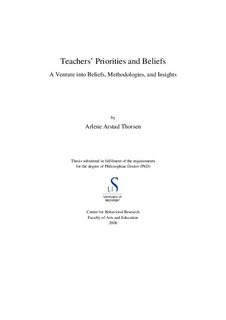Teachers' priorities and beliefs : a venture into beliefs, methodologies, and insights
Doctoral thesis
Permanent lenke
http://hdl.handle.net/11250/185265Utgivelsesdato
2009-01-30Metadata
Vis full innførselSamlinger
- PhD Theses (HF-LMS) [11]
Sammendrag
This study focuses on Norwegian preschool- and schoolteachers’ priorities,
beliefs and their subjective opinions about discipline and behavior
management, group/classroom practices, beliefs about children, and teachers’
instructional and disciplinary self-efficacy beliefs. The theoretical foundation
of this study is on general and developmental systems theory and social
cognitive theories with a major focus on beliefs, developmentally appropriate
practices, and also the background and context in which teachers in daycare
and school work in Norway.
Several methods are combined to study teachers’ beliefs, but the main
emphasis is on Q-methodology. R-methodology was chosen to seek
knowledge of teachers’ views of self-efficacy among 254 respondents. Qmethodology
was used to gain an understanding of teachers’ subjective
feelings and beliefs about the other themes mentioned above. Analyses of Qdata
were conducted on two subgroups of teachers (20 from daycare and 20
from school in each group) drawn among the 254 participants. In addition
follow-up interviews were conducted with six participants from the cohort.
Research has established that beliefs play an important part in the life of
individuals and groups. Teachers are expected to adhere to regulations and
expectations stipulated by laws, policies and curricula, and to participate
actively in relationships with children, parents, colleagues, and others. How
this is done is strongly influenced by personal and formal knowledge, beliefs,
understandings, and values that guide our choices. In addition teachers with a
high sense of efficacy about their teaching capabilities can motivate children
and enhance their cognitive development.
Results from both subgroups in this study point to strongly shared beliefs in
an authoritative teaching style when dealing with discipline and behavior
management. One almost identical operant factor emerged in both subgroups
pointing to a caring, accepting and child-centered view on beliefs about
children. Results here may represent teachers’ existential beliefs independent
of children’s age. The results concerning group/classroom practices are more
varied with two factors (A and B) in Subgroup 1, and three (C, D and E) in
Subgroup 2, but with some similarities between subgroups. Factors A and C represent a relational learning orientation, factor B an academic learning
orientation, factor D a structured learning orientation, and factor E a model
and community learning orientation. Results concerning self-efficacy show no
reports of low instructional self-efficacy. In the whole group of teachers (254)
65.8% of them report to have a medium degree of instructional self-efficacy,
while 34.4% use high values to indicate their own efficacy. There were
statistically significant differences between teachers in daycare and teachers
in school at the p< .05 level in favor of teachers working in daycare. There
were no statistical significant differences between groups concerning
disciplinary self-efficacy. Teachers working in school had a higher mean
score (M = 7.26) than teachers in daycare (M = 7.13), but there were more
teachers in daycare (66.3%) that reported to have a high degree of disciplinary
self-efficacy than teachers in school (62.7%). There is a statistical significant
correlation (r = .63**) between instructional self-efficacy and disciplinary
self-efficacy, indicating those teachers who report to have high instructional
self-efficacy will also report to have high disciplinary self-efficacy.
Comments from the interviewees help substantiate and shed light on results
from Q themes and self-efficacy.
Becoming aware of personal subjectivity and how beliefs, knowledge and
action interrelate in our contact and communication with others, can give a
deeper personal insight and understanding of relationships between teachers
and children and the intentions teachers have for teaching and children’s
learning. In combination with being a critically reflective practitioner, this can
lead to a higher degree of openness and motivation to review and revise
current beliefs and practices and lead to positive changes for both children and
teachers. The possibility for such change has relevance for teacher education,
in-service teachers’ continuous growth, and for implementation of new
curricula. One efficient means of tapping into operant subjectivity is by use of
Q-methodology.
Beskrivelse
Utgiver
University of Stavanger, NorwaySerie
PhD thesis UiS63
